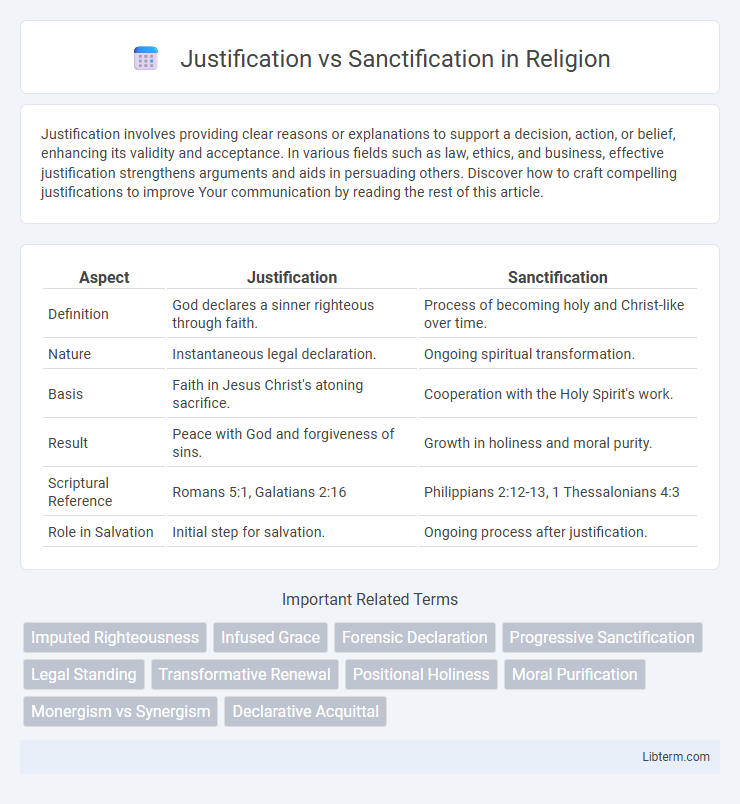Justification involves providing clear reasons or explanations to support a decision, action, or belief, enhancing its validity and acceptance. In various fields such as law, ethics, and business, effective justification strengthens arguments and aids in persuading others. Discover how to craft compelling justifications to improve Your communication by reading the rest of this article.
Table of Comparison
| Aspect | Justification | Sanctification |
|---|---|---|
| Definition | God declares a sinner righteous through faith. | Process of becoming holy and Christ-like over time. |
| Nature | Instantaneous legal declaration. | Ongoing spiritual transformation. |
| Basis | Faith in Jesus Christ's atoning sacrifice. | Cooperation with the Holy Spirit's work. |
| Result | Peace with God and forgiveness of sins. | Growth in holiness and moral purity. |
| Scriptural Reference | Romans 5:1, Galatians 2:16 | Philippians 2:12-13, 1 Thessalonians 4:3 |
| Role in Salvation | Initial step for salvation. | Ongoing process after justification. |
Understanding Justification and Sanctification
Justification is the act of God declaring a sinner righteous based on faith in Jesus Christ, removing the guilt of sin and granting legal standing before God. Sanctification is the ongoing process of spiritual growth and moral transformation that follows justification, enabling believers to become more like Christ through the work of the Holy Spirit. Understanding justification involves recognizing its completed, instantaneous nature, while sanctification emphasizes continuous development in holiness throughout a Christian's life.
Defining Justification: A Legal Declaration
Justification is a legal declaration by God that a sinner is considered righteous through faith in Jesus Christ. This forensic act removes the guilt and penalty of sin, granting the believer a status of acquittal before divine law. It emphasizes the believer's righteousness as imputed, not inherent, assuring forgiveness and acceptance within God's covenant.
The Means of Justification: Faith Alone
Justification is achieved through faith alone, emphasizing that belief in Jesus Christ is the sole means by which individuals are declared righteous before God. Sanctification, in contrast, is the progressive process of becoming holy, involving a lifelong transformation empowered by the Holy Spirit. The doctrine of sola fide underscores that good works follow justification as evidence of faith but do not contribute to earning righteousness.
Defining Sanctification: The Process of Transformation
Sanctification is the ongoing process of spiritual transformation that follows justification, where a believer is progressively made holy through the work of the Holy Spirit. This process involves growing in grace, developing Christ-like character, and overcoming sin through consistent obedience and faith. Unlike justification, which is a one-time legal declaration of righteousness, sanctification is continuous and dynamic, shaping the believer's life toward holiness and eternal maturity.
The Role of the Holy Spirit in Sanctification
The Holy Spirit plays a crucial role in sanctification by actively transforming believers into the likeness of Christ through ongoing spiritual renewal and empowerment. Unlike justification, which is a one-time declaration of righteousness by God through faith in Jesus Christ, sanctification is a progressive, lifelong process driven by the indwelling presence of the Holy Spirit. This divine influence enables believers to overcome sin, cultivate godly virtues, and live in accordance with God's will.
Key Differences between Justification and Sanctification
Justification is a one-time legal declaration by God that a believer is righteous through faith in Jesus Christ, while sanctification is a progressive process of becoming holy and Christlike over time. Justification deals with the believer's position before God, granting forgiveness and imputed righteousness, whereas sanctification involves the believer's daily growth in grace and spiritual maturity. Key differences include justification being instantaneous and complete at conversion, while sanctification is ongoing and requires cooperation with the Holy Spirit.
Biblical Foundations for Justification and Sanctification
Justification is the biblical declaration of righteousness granted through faith in Christ, as emphasized in Romans 5:1 and Galatians 2:16, highlighting the believer's acquittal from sin based on Christ's atoning sacrifice. Sanctification, described in 1 Thessalonians 4:3 and Hebrews 12:14, involves the progressive process of being made holy, empowered by the Holy Spirit to live a Christ-like life. Both doctrines are rooted in Scripture, with justification addressing the believer's legal standing before God and sanctification focusing on moral transformation and spiritual growth.
The Relationship Between Justification and Sanctification
Justification and sanctification are distinct yet inseparable aspects of the Christian salvation process, where justification is the legal declaration of righteousness by faith in Christ, and sanctification is the ongoing transformation into Christlikeness through the Holy Spirit. Justification secures the believer's position before God, while sanctification reflects the believer's progressive growth in holiness and obedience. The relationship between justification and sanctification is foundational, as true justification inevitably produces sanctification, demonstrating the authenticity of faith through a changed life.
Common Misconceptions about Justification and Sanctification
Common misconceptions about justification and sanctification often confuse justification as a process rather than a one-time declaration of righteousness by faith, while sanctification is wrongly viewed as instantaneous instead of an ongoing transformation. Some mistakenly believe justification depends on human works, neglecting its basis solely in Christ's atonement, whereas sanctification involves cooperative growth in holiness through the Holy Spirit. Understanding that justification secures believers' legal standing before God and sanctification progressively shapes their moral character dispels these prevalent errors.
The Importance of Both Doctrines in Christian Life
Justification declares a believer righteous before God through faith in Jesus Christ, establishing their secure position in salvation, while sanctification is the ongoing process of becoming holy and Christlike through the work of the Holy Spirit. Both doctrines are essential as justification provides the foundational assurance of forgiveness and reconciliation with God, whereas sanctification empowers spiritual growth and moral transformation in daily Christian living. Together, justification and sanctification form the backbone of a balanced Christian theology, ensuring both spiritual security and active holiness.
Justification Infographic

 libterm.com
libterm.com